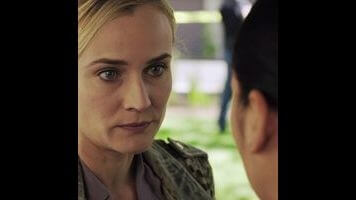The Bridge: “Goliath”

Something occurred to me while I was watching DEA Agent McKenzie make a deal with Sonya about how to circumvent the CIA: The Bridge no longer has a sense of place. The ostensible shift between the first and the second seasons of The Bridge has been this move away from the procedural into the character driven, as stated by executive producer Elwood Reid on several occasions. But a consequence of that shift has been this loss of place, which is something I’ve always enjoyed. Place gives the story a uniqueness and it grounds in its verisimilitude. As grating as the David Tate storyline became over the course of The Bridge’s first season, the plotline was entrenched in border politics. Much like the show’s Scandinavian original that bridged the gap between Sweden and Denmark, the American iteration’s plot rooted The Bridge deeply within the world of the Mexican-American border. This rooted feeling was something that differentiated the show from the other countless mastermind/serial killer entries, especially during last year’s serial killer tipping point. It made David Tate’s story palatable instead of completely laughable. Over and over again, I found myself writing in this space variations praising the world that the writers of The Bridge had created. But while watching McKenzie and Sonya discuss the parameters of their investigation, it hit me that this could really be any other show about the ills of large scale crime. The central crime is so much more rooted in reality this season, meaning that the world that these characters inhabit doesn’t necessarily need to overcompensate in its richness. While it hasn’t been detrimental to individual episodes, I find it a loss for the series. That sense of place was one of the better aspects of The Bridge, and for all of the improvements that have been made in between the seasons—namely getting rid of David Tate—this loss has certainly lessened my enjoyment of the show overall.
This wouldn’t necessarily be so much of a problem if I thought the new direction of the show was wholly better than the previous direction. It has its upsides, as I’ve noted before; it’s more focused on the ensemble, placing a heavier premium on characters like Daniel and Adriana, who admits to her partner that she has told Sonya everything about their story. But The Bridge still has some of the same issues that infiltrated the first season. The central arc of the second season is meant to explore the depth of the corruption in Mexico, from the multinational corporations to the police force, and how it bleeds into the States. But Groupo Clio and its dealing with the Red Ridge View development have taken over. Linder, Eva, and Eva’s vengeance against her attackers continue to feel like they are operating in a separate show (not to mention Charlotte and Ray). In this episode, we learn about Eva and Linder’s childhood but those revelations don’t seem to serve the greater good. Like the first season, there’s not enough of a thread to connect these ideas—corruption on the local level, as is the case with the cops, and corruption on a larger scale level, as is the case with Grupo Clio. To be fair, the Grupo Clio thread is considerably more interesting than Eva’s (deserved) version of Death Wish at this point, with great deference to Ramón Franco and Bruno Bichir whose mounting (passive) aggression have been a highlight of the second season. Franco’s portrayal of Fausto is part of the reason that this man, is the main reason I hoped his character escaped the clutches of the Marinas.
“Goliath” is a transitional episode leading to the final run of the second season. Fausto has not just had his hiding place raided by the Marinas, but he’s lost a key component to his business: Eleanor’s Acorn Man. She stayed loyal to him, rather than say, jumping ship to the considerably more-above-board Cerisola, because Fausto had control of the Acorn Man. Now, that control has been wrested away from him and his power inherent in Eleanor’s knowledge of his businesses is in jeopardy.
Similarly, Sonya is now at a crossroads. The major male presences in her life have all but abandoned her because of her own standards and inability understand the human frailties around her: She believes Jack Dobbs is the reason her sister is dead, Hank Wade broke the rules, and Marco withheld information about his relationship with Fausto from her. She has lost her romantic partner, her father figure, and her friend in the span of days. She is a woman adrift and, by the end of the episode, a woman captured (in one of the episode’s excellent action setpieces) by one another entry into The Bridge’s parade of weirdos (the Chopper, this time) that don’t compensate for the aforementioned loss of place. “Goliath” highlights once again how far Marco and Sonya have been kept apart throughout the season. Hopefully her capture will bring them back together, as they should be.